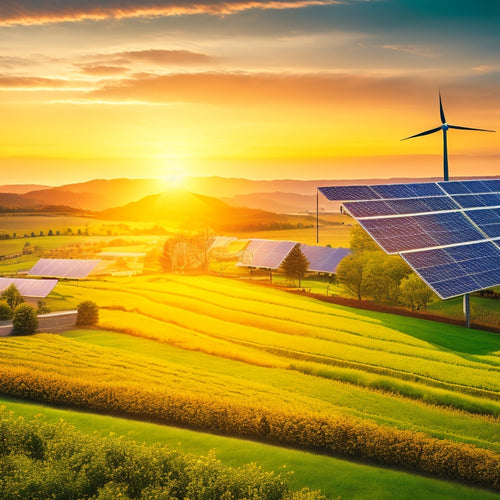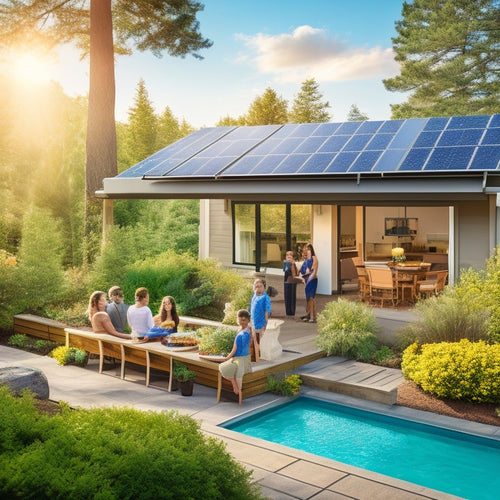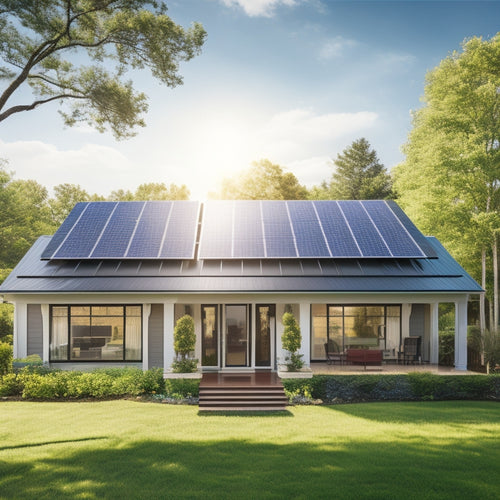
Smart Home Energy Management Solutions
Share
By implementing smart home energy management solutions, you can reduce your energy waste by up to 30% and markedly lower your energy bills. These advanced systems optimize energy usage patterns for efficiency, conducting energy audits to identify areas of waste and opportunities for improvement. Real-time monitoring and tracking of energy consumption enable data-driven decisions to minimize waste and enhance efficiency. Additionally, AI-powered optimization and personalized recommendations encourage behavioral adjustments, leading to substantial energy savings over time. As you investigate these solutions, you'll uncover more ways to refine your energy management strategy and make a meaningful impact on your energy consumption.
At a Glance
- Smart home energy management systems optimize energy usage patterns, reducing energy bills by up to 30% through efficient appliances and scheduling.
- Real-time energy monitoring and tracking provide instant insights into energy consumption, enabling immediate adjustments and habitual energy conservation.
- Incorporating renewable energy sources, such as solar panels, reduces reliance on non-renewables, lowers grid dependence, and minimizes environmental footprints.
- Advanced AI-powered optimization offers personalized recommendations for minimizing energy waste, reducing carbon footprints, and achieving cost savings.
- Conducting thorough energy audits identifies inefficiencies, reveals insights into energy-intensive habits, and develops strategies to reduce energy consumption during peak usage times.
Reduced Energy Waste Guaranteed
You can rest assured that smart home energy management systems optimize your energy usage patterns, ensuring that every watt is employed efficiently.
By leveraging solar energy storage solutions renewable energy storage, you can store excess energy generated during the day to use at night or during power outages, minimizing energy waste.
With real-time energy monitoring, you'll gain visibility into your energy consumption, allowing you to identify and eliminate unnecessary waste.
Optimized Energy Usage Patterns
Efficient energy management in a smart home relies heavily on optimized energy usage patterns, which involve identifying and eliminating unnecessary energy consumption. By integrating smart thermostats, you can regulate temperature settings to minimize energy waste.
Additionally, incorporating renewable energy sources, such as solar or wind power, can markedly reduce your reliance on non-renewable energy. Automated energy scheduling allows you to program your appliances to operate during off-peak hours, reducing strain on the grid.
User behavior analysis and predictive energy modeling help you identify areas of inefficiency and make informed decisions to optimize your energy usage. In addition, integrating a home battery storage system can store excess energy generated by your solar panels, allowing you to use it during off-peak hours or emergencies.
Moreover, with the ability to optimize energy consumption and reduce reliance on the grid, you can achieve greater control over your energy costs and a more sustainable living experience. Demand response strategies, such as load shedding, can also be implemented to reduce energy consumption during peak hours.
Additionally, energy-efficient appliances and smart grid technology can optimize energy distribution and consumption. Conducting household energy audits and following energy conservation tips can also help you reduce energy waste.
Real-Time Energy Monitoring
Real-time energy monitoring enables homeowners to track their energy consumption patterns instantaneously, thereby securing reduced energy waste.
With smart sensors installed throughout your home, you'll receive real-time data on your energy usage, allowing you to identify areas of inefficiency and make adjustments on the fly.
Energy analytics will provide you with actionable information, enabling you to take control of your energy consumption and reduce your carbon footprint. This user engagement is key to making behavioral adjustments that lead to significant energy savings.
To avoid sudden power outages that can disrupt your daily life and damage your important electronics, consider investing in a Battery Backup System to guarantee uninterrupted operations.
By having a reliable power source, you can focus on optimizing your energy consumption without worrying about data loss or equipment damage.
Data visualization tools will help you understand your energy usage patterns, making it easier to optimize your energy consumption.
Additionally, predictive maintenance features will alert you to potential issues before they become major problems, reducing the risk of system downtime.
With mobile applications, you'll have access to your energy usage data anytime, anywhere.
Plus, system interoperability guarantees seamless integration with renewable energy sources, such as solar panels, allowing you to maximize your energy independence.
Saves Up to 30%
You can expect significant energy bill reductions with smart home energy management, which can save you up to 30% on your energy costs.
By implementing cost-cutting measures, you'll be able to optimize your energy consumption and minimize waste.
With the integration of photovoltaic cells and efficient residential solar panels(https://www.illchanterl.com), you can further reduce your reliance on non-renewable energy sources.
This means you'll not only reduce your environmental footprint but also see a noticeable decrease in your energy expenses.
Energy Bill Reduction
By integrating smart home energy management systems, homeowners can reap significant savings on their energy bills, with reductions of up to 30% achievable through optimized energy consumption. You can take control of your energy usage and make data-driven decisions to minimize waste and reduce your carbon footprint.
Smart appliances, designed to interact with your energy management system, can automatically adjust their power consumption based on your needs and preferences. For instance, your smart thermostat can learn your daily schedule and optimize heating and cooling to minimize energy waste when you're not home.
Furthermore, renewable integration enables you to utilize the power of solar or wind energy, reducing your reliance on the grid and lowering your energy bills. Your energy management system can seamlessly integrate with these renewable sources, ensuring that you maximize their potential and minimize your energy costs.
Cost Cutting Measures
Optimizing energy consumption through smart home energy management systems can lead to considerable cost savings. By implementing budget-friendly solutions, you can reduce your energy expenditure considerably.
One effective way to do this is by incorporating energy-efficient appliances and smart thermostats, which can learn your schedule and preferences to optimize energy usage. Additionally, integrating renewable energy sources, such as solar or wind power, can additionally reduce your reliance on non-renewable energy and lower your utility bills.
To maximize cost cutting measures, consider conducting an energy audit to identify areas for enhancement in your home. This will help you pinpoint opportunities to make behavioral changes, such as turning off lights and electronics when not in use.
By automating these tasks through home automation tips, you can guarantee that these changes become habitual. Moreover, comparing your utility cost with others in your area can provide beneficial observations into your energy usage patterns.
Real-time Energy Usage Tracking
You can gain a deeper understanding of your energy usage patterns by tracking your energy consumption in real-time.
With live consumption data, you'll be able to identify areas of inefficiency and opportunities for optimization.
By leveraging home energy storage systems, such as solar panel storage systems solar power storage for homes, you can store excess energy generated during the day for later use, reducing your reliance on the grid.
Energy Usage Patterns
Real-time energy usage tracking enables homeowners to monitor their energy consumption patterns, providing beneficial understandings into their daily habits and appliance usage.
By analyzing your energy usage patterns, you can identify areas where behavioral influences, such as leaving lights on or using energy-intensive appliances, impact your consumption habits. Seasonal variations in energy usage also become apparent, allowing you to make lifestyle adjustments to optimize energy efficiency.
User engagement with smart home energy management systems encourages active participation in managing energy consumption. You can assess the appliance efficiency of your devices and make informed decisions about replacing them with more energy-friendly alternatives.
Additionally, real-time energy usage tracking facilitates the integration of renewable energy sources, such as solar or wind power, into your energy mix. As you adopt this technology, you'll become more aware of your consumption habits and can respond to demand response signals, adjusting your energy usage to reduce peak demand.
Live Consumption Data
How much energy are you wasting right now? With live consumption data, you'll have the answer at your fingertips.
This real-time energy usage tracking feature gives you instant access to your home's energy consumption patterns. You'll know exactly which appliances, lights, and devices are guzzling the most energy, and when.
Live data integration allows you to monitor your energy usage in real-time, giving you the power to make informed decisions about your energy consumption.
With consumption analytics, you can identify areas of inefficiency and take corrective action. This might mean adjusting your thermostat, switching to energy-efficient light bulbs, or optimizing your appliance usage.
Assess Your Energy Profile
You'll need to analyze your energy usage patterns to understand when and how you're consuming energy. This involves identifying your peak usage hours, days, and seasons, as well as pinpointing which appliances and devices are using the most energy.
With the help of smart thermostats and energy monitoring systems, you can gather useful observations into your energy consumption habits. Additionally, you can utilize home automation systems to optimize your energy usage and reduce waste.
Energy Usage Patterns
Understanding your energy usage patterns is essential in optimizing your home's energy consumption. By analyzing your behavioral observations, you can identify consumption trends that are unique to your household. This involves tracking your energy usage over time, considering factors such as the time of day, day of the week, and season.
You'll gain significant revelations into your energy-intensive habits, such as when you use the most energy, which appliances consume the most power, and how your energy usage changes throughout the year.
With this information, you can develop strategies to reduce your energy consumption. For instance, you might uncover that you use a lot of energy in the morning when getting ready for work or school. You can then adjust your routine to reduce energy usage during this time, such as by turning off lights and appliances when not in use.
Identify Energy-Wasting Areas
Now that you've gained comprehension into your energy usage patterns, it's time to pinpoint areas where energy is being wasted.
Conducting an energy audit is an essential step in identifying energy-wasting areas in your home. This involves a thorough examination of your energy usage habits, appliances, and systems to detect inefficiencies.
You'll need to gather data on your energy consumption, including your energy bills, appliance usage, and behavioral observations.
Advanced AI-Powered Optimization
You can utilize advanced AI-powered optimization to analyze your energy usage patterns and identify opportunities for energy efficiency gains.
Through machine learning algorithms and real-time data analysis, you can pinpoint areas of inefficiency in your home's energy profile.
Energy Efficiency Analysis
Energy Efficiency Analysis (Advanced AI-Powered Optimization)
As you integrate smart home energy management solutions, you'll want to explore deeper into energy efficiency analysis to maximize your energy savings. This advanced AI-powered optimization involves conducting thorough energy audits to identify areas of inefficiency. By analyzing consumption trends, you'll uncover opportunities to optimize your energy usage.
| Energy Efficiency Metric | Optimization Strategy |
|---|---|
| Peak Hour Energy Usage | Shift non-essential loads to off-peak hours |
| Standby Power Consumption | Implement smart plugs to eliminate standby power |
| Energy Intensity per Square Foot | Optimize lighting and HVAC systems |
| Energy Consumption per Appliance | Upgrade to energy-efficient appliances |
| Renewable Energy Integration | Incorporate solar or wind power sources |
Through advanced AI-powered optimization, you'll receive personalized recommendations to minimize energy waste, reduce your carbon footprint, and enjoy significant cost savings. By leveraging these observations, you'll be well on your way to achieving a more sustainable and energy-efficient smart home.
Frequently Asked Questions
Is Smart Home Energy Management Compatible With All Types of Appliances?
You'll find that most modern appliances are compatible, but older or specialized ones might not be. When shopping, look for appliances with energy efficiency labels to guarantee seamless integration and maximum energy savings with your smart home system.
Can I Control My Energy Usage Remotely Through a Mobile App?
Like a conductor leading an orchestra, you'll expertly control your energy usage from anywhere, using a mobile app that offers remote monitoring and comprehensive energy analytics, granting you the freedom to optimize your consumption at your fingertips.
How Does the System Handle Energy Surges or Power Outages?
When the grid falters, you're protected: the system's surge protection shields your devices from voltage spikes, and its outage recovery protocol guarantees a seamless restart, so you can get back to living life on your terms, uninterrupted.
Are Smart Home Energy Management Systems Secure From Cyber Threats?
As you traverse the digital domain, you're wise to wonder: are your online strongholds secure from cyber threats? Data privacy is paramount, and sturdy cybersecurity measures safeguard against potential vulnerabilities, ensuring user authentication keeps your digital fortress impenetrable.
Can I Integrate the System With Existing Home Automation Systems?
You can integrate the system with existing systems, ensuring automation compatibility, by checking the system's open protocols, APIs, and industry standards, such as Zigbee or Z-Wave, to enable seamless communication and control between devices.
Explore More
You'll experience reduced energy waste, guaranteed, with our smart home energy management solutions. Saving up to 30% on your energy bills is just the beginning. With real-time energy usage tracking, you'll gain a clear understanding of your energy profile. Then, our advanced AI-powered optimization kicks in, fine-tuning your energy usage to maximize efficiency. By streamlining your energy consumption, you'll minimize waste, reduce costs, and optimize your energy profile, all in one seamless process.
Related Posts
-

Net Metering in Renewable Energy's Future
Net metering's future is vital for driving renewable energy growth and financial savings. You can reduce your electri...
-

Top-Rated Home Solar Power Kits for Achieving Energy Independence
Top-rated home solar power kits enable you to achieve energy independence by greatly cutting your energy costs. You c...
-

Home Solar Installation Cost
You're considering installing solar panels on your home, and the upfront cost is likely the biggest hurdle standing i...


